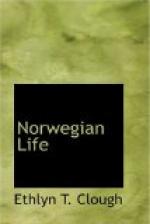Verner von Heidenstam is now foremost among the writers of his country. His early works, Endymion, Hans Alienus, and others, raised him to this rank, and his last two productions, The Carolines (the companions of Charles XII) and Saint Brigitt, have more than confirmed it. Hans Alienus was, like Goethe’s Faust, a work of deep philosophical research into the problems of existence, the purpose and significance of life, set forth in symbolical images and explained by allegory. In the Carolines, a series of short stories connected by the red thread of history which runs through them, he gives a new conception, but a wonderfully graphic and striking one, of Charles XII and his times. It is an epic, and yet so living and so human a picture of the wild, iron-souled, quick-tempered hero, whose “eyes flew around like two searching bees,” and whose will was like the steel of his sword; who had the heart of a lion and a “woman’s hatred for women,” but for whom men shed their blood freely; who “never grieved over a misfortune longer than the darkness lasted,” and was “best loved by those who tried to hate him.” His pictures are drawn by a master hand, and with the intuitive coloring of genius. Saint Brigitt carries us back to medieval Sweden. Here, too, the picture is lifelike, centered round the struggle of a high-minded woman, who makes everything bend to her stern rule of holiness, her thirst for sanctity, as Charles XII did to his inexorable policy and thirst for dominion.
The psychological and the historical novel, the latter, in its modern conception, akin to the former, since it is a study of the psychology of historical characters and a historical epoch, is the form of fiction at present most in vogue. It is in this form that such writers as Tor Hedberg, Per Hallstroem, and Axel Lundegard have made their reputations. Tor Hedberg’s romances embody profound analysis of the inner workings of the soul, of the secret motives which, more or less consciously, determine a man’s acts. In this line he ventures on the most difficult psychological problems. In his Judas, a scriptural romance from which he has drawn a drama, he attempts to solve the darkest psychological enigma that has puzzled humanity, viz., to analyze the motives which led Judas to betray his Master and become the typical traitor. The character he draws of him is original and striking, and departs entirely from the accepted tradition. But bold and subtle as the theory is, it is far from convincing. His Judas is a dark, brooding spirit, fierce and inharmonious, divided between extatic love and admiration of his Master and inward irresistible forces of hatred and revolt: a double nature, thirsting for freedom and love, yet predestined to evil, and led by fearful secret impulses to the accomplishment of his destiny and the fulfilment of his mission, necessary to the scheme of salvation. He rushes blindly to his fate while struggling in




